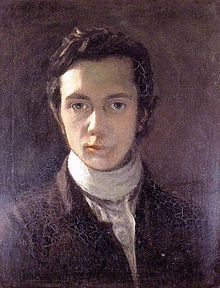 The principles and professions change: the man remains the same. There is the same spirit at the bottom of all this pragmatical fickleness and virulence, whether it runs into one extreme or another: to wit, a confinement of view, a jealousy of others, an impatience of contradiction, a want of liberality in construing the motives of others, either from monkish pedantry, or a conceited overweening reference of everything to our own fancies and feelings. There is something to be said, indeed, for the nature of the political machinery, for the whirling motion of the revolutionary wheel which has of late wrenched men’s understandings almost asunder, and “amazed the very faculties of eyes and ears”; but still this is hardly a sufficient reason, why the adept in the old as well as the new school should take such a prodigious latitude himself, while at the same time he makes so little allowance for others. His whole creed need not be turned topsy-turvy, from the top to the bottom, even in times like these. He need not, in the rage of party spirit, discard the proper attributes of humanity, the common dictates of reason. He need not outrage every former feeling, nor trample on every customary decency, in his zeal for reform, or in his greater zeal against it. If his mind, like his body, has undergone a total change of essence, and purged off the taint of all its early opinions, he need not carry about with him, or be haunted in the persons of others with, the phantoms of his altered principles to loathe and execrate them. He need not (as it were) pass an act of attainder on all his thoughts, hopes, wishes, from youth upwards, to offer them at the shrine of matured servility: he need not become one vile antithesis, a living and ignominious satire on himself.
The principles and professions change: the man remains the same. There is the same spirit at the bottom of all this pragmatical fickleness and virulence, whether it runs into one extreme or another: to wit, a confinement of view, a jealousy of others, an impatience of contradiction, a want of liberality in construing the motives of others, either from monkish pedantry, or a conceited overweening reference of everything to our own fancies and feelings. There is something to be said, indeed, for the nature of the political machinery, for the whirling motion of the revolutionary wheel which has of late wrenched men’s understandings almost asunder, and “amazed the very faculties of eyes and ears”; but still this is hardly a sufficient reason, why the adept in the old as well as the new school should take such a prodigious latitude himself, while at the same time he makes so little allowance for others. His whole creed need not be turned topsy-turvy, from the top to the bottom, even in times like these. He need not, in the rage of party spirit, discard the proper attributes of humanity, the common dictates of reason. He need not outrage every former feeling, nor trample on every customary decency, in his zeal for reform, or in his greater zeal against it. If his mind, like his body, has undergone a total change of essence, and purged off the taint of all its early opinions, he need not carry about with him, or be haunted in the persons of others with, the phantoms of his altered principles to loathe and execrate them. He need not (as it were) pass an act of attainder on all his thoughts, hopes, wishes, from youth upwards, to offer them at the shrine of matured servility: he need not become one vile antithesis, a living and ignominious satire on himself.
—William Hazlitt
“On Consistency of Opinion” in Selected Writings





